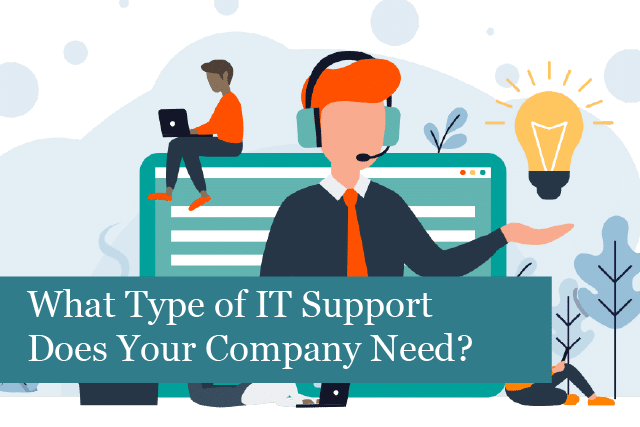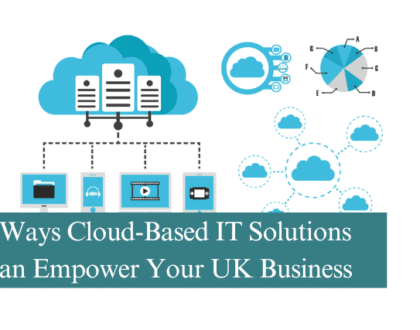
In the past year, over 726,000 new businesses were started in the UK! That’s an amazing figure, even considering the events of the last year and a half. So what do all of these businesses have in common? Every company, no matter its size or industry, requires some form of IT support.
If you have a company trying to figure out what type of IT support is needed, this article may help you. We’ve put together some information about what IT support is and the variety of issues it covers.
What is IT Support?
Let’s start with what “IT” stands for. IT stands for Information Technology and is a form of technical support. IT specialists provide assistance across a wide range of issues, including computer technology and much more.
Some companies have an internal IT department, while others may use a hybrid mix of internal and external IT support. External IT support is offered by a vendor (managed service provider or MSP) who helps other companies with their technology and Internet issues.
With this basic understanding in mind, let’s take a look at some of the issues covered by IT support.
1). Every Day IT Issues
Most of us are familiar with everyday IT problems. Common IT issues can include a computer running too slow, Internet connections not working, and more. Solving small IT problems on your own may be possible, but what happens if you’re facing a critical deadline? You probably don’t have time to fix it on your own, and this is where a managed service provider can help.
MSPs have the knowledge and experience to quickly tackle even everyday IT issues. They can provide guidance over the phone, via remote control, or even in person. Managed service providers also have advanced monitoring technology that lets them see IT problems before they develop into more significant issues.
2). Management of Software Upgrades & Updates
Software upgrades and updates are another critical part of IT management. The software requires regular updates and upgrades to keep devices and infrastructures safe and secure. If a business fails in this area of IT, then it becomes vulnerable to all types of cyberattacks, hardware issues, and more.
MSPs can help keep your company’s software updated and upgraded regularly. For instance, they can ensure that all operating systems on company devices receive essential fixes and updates. But a managed service provider also ensures the network is up and running. They take care of all the backend configuration and other issues. Then employees can focus on their own work.
Some software management work that an MSP can provide includes:
- Antimalware software: an MSP can ensure your company is thoroughly protected by anti-malware software and keep the software updated.
- Patching & maintenance: most software requires patches and regular maintenance. A managed service provider ensures your network and software are updated to keep cyber criminals and viruses from attacking your network.
These are only two examples of the types of software management an MSP can handle.
3). Long-term Hardware Investment
Computers and workstations are at the heart of any business. You’re dependent on computers and other devices to be fast and reliable in order to get work done. But do you know when it’s time to upgrade your hardware? If not, then a managed service provider can help you with this.
MSPs know when it’s time to repair, upgrade, or even invest in new hardware. They can help your company decide if it’s time to buy new or perhaps lease hardware. An IT support partner can help you plan out your long-term hardware investment and which options are best for your business.
4). Moving to the Cloud
These days, no one is completely tied to their computer or hard drive anymore. Thankfully, those days are long gone! Instead, most companies today use cloud storage solutions, making files and documents available across multiple devices. One example of a popular cloud storage solution is Microsoft OneDrive.
Microsoft 365 provides even more. M365 is a cloud infrastructure, which means your business doesn’t have to have a central server on the premises. Instead, this is a service that combines Office apps with a cloud network. It’s even possible to create virtual desktops, which can be used at work or remotely.
5). Backup & Disaster Recovery
Every business faces the possibility of cyber-attacks and disasters, which means it’s crucial to have a risk management plan put together. What would happen if a major weather event destroyed your company? What if your business premises were destroyed by fire? How would your company get back up and running without a backup and recovery plan?
If you’re not sure how to implement a backup and recovery plan, an MSP can guide you through the process. Part of their process will be to regularly run backups of your system and files. The backup can be used to restore files if they are destroyed or stolen.
With the right backup & recovery plan in place, your company will be able to restart regular operations much sooner and not suffer the losses associated with a significant outage.
6). Scalability & Growth
What happens if your business starts to scale up? Sudden growth can occur, putting an extreme strain on company resources. While business growth is exciting, it’s essential to make sure your company’s network can withstand such significant changes.
With an MSP, you’ll have an IT partner and support that can help your company grow and scale without major problems. They can let you know which laptops or workstations are best. A managed service provider also knows about meeting security regulations and compliance within specific industries. An MSP can help your company scale smoothly and successfully.
7). Other Types of MSP Support
There’s a wide variety of IT support issues that an MSP can help solve, including:
Data analytics: an MSP can analyse your company’s data for trends and patterns to help your organisation develop business and marketing strategies.
SaaS: MSPs can also provide software that your company needs through a subscription service. Your business saves money by using a subscription rather than purchasing expensive software.
Communications services: managed service providers may also provide communication services that your business needs, especially if you have remote workers. Services can include telephony, data, and video that are all managed by the MSP.
Summing It Up
There are many ways a managed service provider can help your company with IT services. With everything going digital these days, an IT support partner can help guide your business through the maze of technology available today.
If you’re struggling with IT issues and would like to learn more about managed IT services, then contact us today. We’re happy to answer all of your questions and provide the expert guidance and advice your business needs.
Recommended Posts

Prepare for Windows 10 End of Life: What You Need to Know
18th July 2025

5 Ways Cloud-Based IT Solutions Can Empower Your UK Business
12th July 2025

Are you making the most of your Microsoft 365 licensing?
4th July 2025
